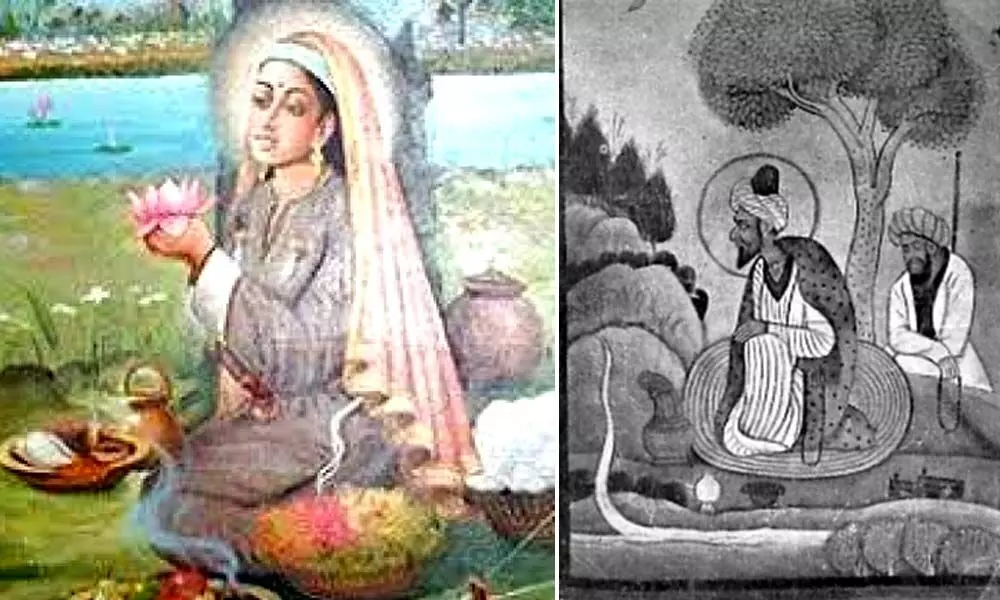The birth of Sufism in Kashmir

The birth of Sufism in Kashmir (Photo/IANS)
Sufism, or Tasawwuf, is an ideological belief system of the Islam mysticism that took off in the 7th century by mystics from the Central Asia who avowed that they had discovered the way to obtain knowledge of Allah.
Srinagar: Sufism, or Tasawwuf, is an ideological belief system of the Islam mysticism that took off in the 7th century by mystics from the Central Asia who avowed that they had discovered the way to obtain knowledge of Allah. The term Sufi (meaning the "man of wool" in Arabic) was coined for these ascetics who wore coarse woollen garments known as 'sufu'.
Sufism is a corridor to expansion of consciousness and realization of self and the universe as a whole. It unlocks the innate spiritual and intuitive abilities of the practitioner while bringing about a holy communion with God through a personal relationship with the Divine. They emphasized on seven stages to be one with God: Repentance, Abstinence, Renunciation, Poverty,
Patience, Trust in God, and Submission to the will of God.
The unsteady economic conditions along with unrivalled social domination of the Brahmin class created space for a culture based on the doctrine of love, compassion, common identity, and submission to God regardless of caste and financial position. It introduced new arts that gave everyone an equal chance to earn livelihood, fight poverty, and social upliftment.
The prominent orders (silsilas) of Sufism in Kashmir are the Naqshbandi, the Qadris, the Suhrawardi, the Kubrawi and the Rishis. Besides the order of Rishis which have local origins, the other orders were brought in from Iran and Central Asia. Sufi saints quickly gained popularity on account of their devoutness and sincerity. Kashmiris initially converted to this brand of Islam under the guidance of Sufis and further at the point of the sword by the Muslim invaders who ruled the region for five centuries thereafter; although it is noteworthy to mention that Islam could never gain its true dogmatic form in the valley, rather it formed a new face taking up local beliefs, a synthesis of Advaita and Sufism. Its counterparts in Central and South Asia are world apart. Kashmiri Sufism has a certain disposition, an amalgamation of reasoning of Islamic lessons and tantric methods of Hindu Shaivism.
At the end of the 9th century, Sufism was introduced as a 'softer' version of Islam which promoted the idea of 'religious humanism'. It entered Kashmir with Hazrat Bulbul Shah of the Suhrawadi order who visited the valley during the rule of King Suhadev in the thirteenth century. After him, the mission was carried forward by Sufis like Sayyed Jalal-ud-din of Bukhara and Sayyed Taj-ud-din, who propagated it in the reign of Sultan Shihab-ud-din (1354-73).
But the most influential of the Sufis was Mir Sayyed Ali Hamadani. He travelled to the valley with 700 disciples for a longer stay in 1372 spreading Islam and principles of Kubrawi Sufi order and with his academic and spiritual aura attracted masses. He contributed to fields of philosophy, jurisprudence and ethics, and crafts as a means of livelihood. The common man was persuaded by Hamadani's simple but comprehensive code of conduct to help him earn a virtuous life and achieve salvation. His teachings were based on the idea of Tawheed (oneness of God), Ikhlas (purity), Taqwa (God-fearing piety), and Unity, and such logical and undemanding concepts earned him popularity and acceptation by the both peasants and upper classes. He suggested ways to improve the irrigation system of the valley, introduced the shawl workmanship craft, and urged the Sultan to open small-scale craft industries.
The Mongol invasion crumbled the economy and the socio-political structure of Kashmir and created a void in the region. Hamdani's teachings kick-started development in the valley and reintroduced an indigenous religious order, Rishism or Rishi request a Hindu-Muslim syncretic custom made Sufism which acquired Kashmir the title of 'Rish Vaer' and 'Pir Vaer' (the abode of Rishis and Pirs). The origin of Rishi order goes back to pre-Islamic ancient Vedic period when hermits would renounce material earthly pleasures, retire to mountains, caves, and forests, and dedicate their lives to God. The Rishi movement was started by Nund-Rishi(1377-1440), fondly known as Sahazanand (The blissful one). He moulded this pre-historic practice with the contemporary Sufi order stressing upon universal values of peace, harmony, and fraternity between all creatures of God irrespective of religion. He considered the fourteenth century revolutionary Shaivite female mystic of Kashmir, Lal Ded (The Realized One), his guru. This potpourri of mixed and borrowed principles and practices of the two ideologies of Shaivism (Hinduism) and Sufism (Islam) bridged the gap between people of different castes and faiths contributing to the collective identity of people referred to as 'Kashmiriyat', a representation of religious tolerance never known before.
The philosophy of Kashmiri Sufis and Rishis built this Kashmiri ethnic identity. Both Kashmiri Hindus and Muslims share common customs and beliefs and Sufi and Hindu shrines attract crowd from both communities. The thin lines between religious boundaries and the pluralistic cultural order of Kashmir are cornerstone of the unique concept of Kashmiriyat.
Kashmiriyat had faced a major setback since the 1989 outbreak of Pakistan sponsored terrorism, the beginning of political and ideological movement of fundamentalist Islamic reign that led to mass killings of innocents and exodus of the Kashmiri Hindu community, tearing through the secular, inter-faith harmony of the two religious communities, stirring religious extremism. But today when the people of Kashmir are overcoming the side effects of extremist Islamic character unleashed upon them and the subsequent identity crisis, people are reminded of the metaphysical and mystical Rishis and Sufi saints of the valley who brought solace in times of hardships, spreading the message of oneness and collective identity, with the focus of being One with the Creator.
Sufism is indeed panacea to all kinds of present day ills in the valley and needs to be practised at all levels in the society. It is knocking the Kashmiris to return to their roots.

















